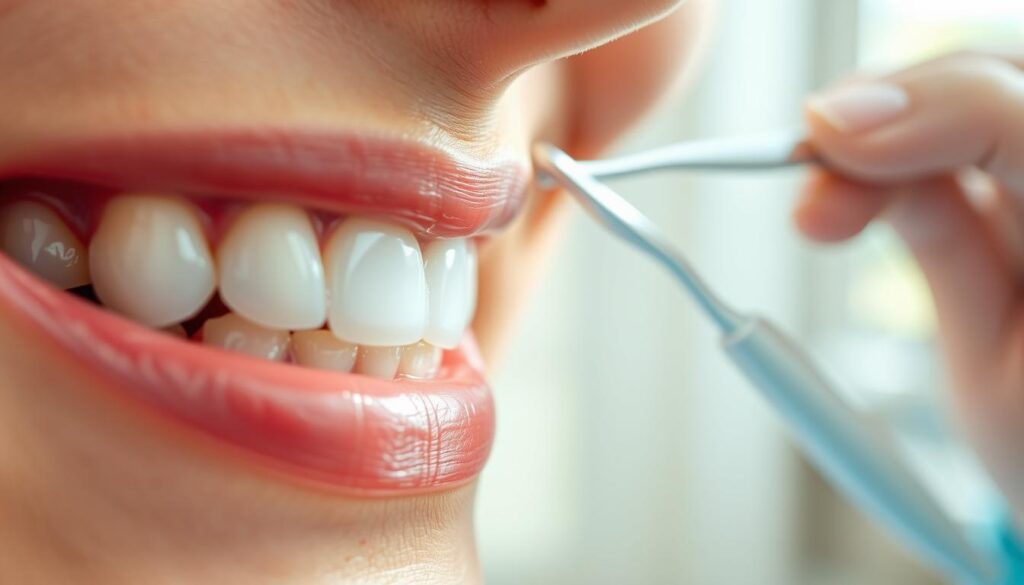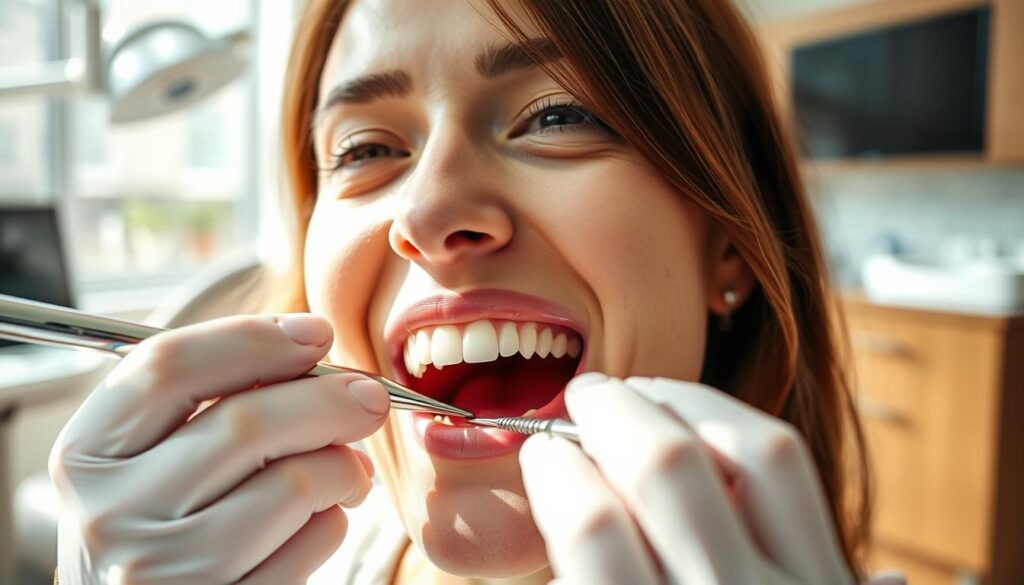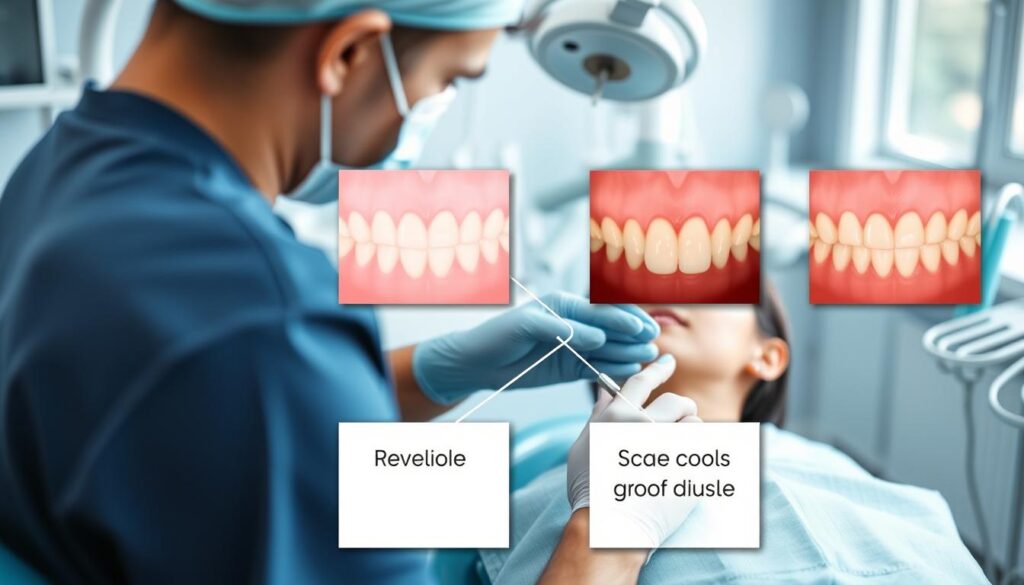What is Gum Disease and Will a Cleaning Help Prevent It?

Is a professional cleaning the key to stopping gum disease? Some ask if brushing alone can cover all bases.
Experts at NCBI Bookshelf and InformedHealth.org say plaque buildup causes gum disease. Deep cleanings, or scaling and root planing, aim at debris below the gum line. The big question is: What is gum disease and will a cleaning help prevent it?
Key Takeaways
- Gum disease starts when plaque lingers on tooth surfaces and gums.
- Plaque can harden into tartar if left unremoved.
- Routine cleanings reduce harmful bacteria and inflammation.
- Deep cleanings address concerns beneath the gum line.
- Consistent dental visits help detect early gum issues.
- Good oral habits and regular check-ups are essential for prevention.
Understanding Gum Disease
Many wonder, “What is gum disease?” It’s an inflammatory condition caused by harmful bacteria around the gumline. Keeping up with daily hygiene and regular dental visits can help manage this.
Definition of Gum Disease
Gum disease, also known as periodontal disease, affects the gums and teeth support. In the early stage, called gingivitis, it can be reversed with good brushing, flossing, and dental check-ups. The Brighton Periodontal & Implant Dental Group emphasizes the importance of early treatment to keep gums healthy.
Types of Gum Disease
Gum disease comes in mild forms like gingivitis and more serious periodontitis. In periodontitis, gums may pull back or bleed. Both start with plaque, which irritates the gums if not removed. If left untreated, it can cause teeth to become unstable.
Causes and Risk Factors
Several factors can lead to gum disease, including:
- Poor oral hygiene practices
- Smoking or tobacco use
- Genetic predisposition
- Systemic conditions such as diabetes
“Healthy gums lay the foundation for overall oral wellness,” states the American Dental Association.
| Factor | Potential Impact |
|---|---|
| Insufficient Brushing | Promotes bacterial growth |
| Smoking | Impairs gum healing |
| Stress | Lowers immune response |
Signs and Symptoms of Gum Disease
Mild discomfort in the gums can often go unnoticed. Some might dismiss light bleeding during brushing as normal, yet it can hint at deeper oral issues. Identifying these signs supports effective gum disease prevention and protects long-term dental health.
Early Warning Signs
Subtle symptoms may include reddish gum tissues and lingering bad breath. Light swelling or occasional bleeding is typical at this stage. Paying attention to these signals can lead to swift care and thorough professional evaluation.
Advanced Symptoms
Receding gums, visible tooth roots, and persistent soreness reveal more serious progression. Some experience increased sensitivity that disrupts daily routines. Tooth instability may arise when gingivitis advances, threatening overall dental integrity.
Importance of Early Detection
Taking action at the first sign of trouble often stops worsening inflammation or bone loss. Early intervention rewards patients with faster improvements and reduced treatment expenses. Regular exams and cleanings foster gum disease prevention by allowing clinicians to implement targeted therapies and protect oral structures before complications escalate.
The Connection Between Oral Hygiene and Gum Disease
Daily care is key to keeping gums healthy. It acts as a shield against common gum problems. Regular habits help fight off harmful bacteria and boost the effects of professional cleanings.

Role of Regular Brushing
Brushing well removes plaque before it turns into tartar. Using fluoride toothpaste and a soft-bristle brush helps keep enamel strong. Brushing in circular motions with gentle pressure protects gums from irritation.
Importance of Flossing
Flossing reaches areas bristles can’t. It removes stuck food and stops bacteria from growing. Dentists often recommend these steps for cleaning between teeth:
- Slide floss between teeth with gentle movements
- Curve it around each tooth to reach below the gumline
Impact of Mouthwash
Mouthwashes with antimicrobial agents add extra protection. They fight off remaining deposits and keep gums healthy by killing harmful bacteria. Regular mouthwash use supports strong gum health over time.
What Happens During a Professional Cleaning?
Teeth get special care to fight plaque and bacteria. This helps keep your mouth healthy. Dentists also give tips to keep your mouth clean between visits.
Overview of Dental Cleaning Procedures
Dentists use special tools to clean teeth. They use ultrasonic devices and hand scalers to remove plaque. Then, water is used to wash away any leftover bacteria.
This process makes sure all parts of your teeth are clean. It’s important for keeping your gums healthy.
Difference Between Routine and Deep Cleanings
Routine cleanings focus on the top part of your teeth. Deep cleanings, or scaling and root planing, go below the gumline. They smooth out the roots of your teeth.
This helps your gums to heal and attach to your teeth better. It’s a way to fight serious gum disease.
| Key Aspect | Routine Cleaning | Deep Cleaning |
|---|---|---|
| Focus | Surface Plaque | Root Debris |
| Purpose | Preventive Care | Periodontal Treatment |
Aftercare Following a Cleaning
After a cleaning, you might get special mouthwashes or fluoride treatments. Following your dentist’s advice helps your mouth heal. It also keeps your teeth clean for longer.
How Regular Cleanings Can Help Prevent Gum Disease
Going to the dentist regularly is key to keeping your gums healthy. They remove buildup that can harm your gums. You also get tips on how to care for your teeth at home.
Dentists use special tools to clean your teeth well. They look for signs of problems early. This helps keep your mouth healthy and boosts your confidence.
Removing Plaque and Tartar
They clean out stuff that brushing can’t get. This stops bad bacteria from harming your gums. It also lowers the risk of infections.
Reducing Inflammation and Bacteria
Scaling and polishing kill bacteria. This helps your gums heal. It also makes your immune system stronger.
Regular Monitoring of Gum Health
Dentists watch for signs of trouble. They adjust your care plan as needed. This helps prevent serious problems.
- Consistent supervision to spot subtle shifts
- Early adjustments in treatment plans
| Visit Frequency | Key Benefit | Primary Goal |
|---|---|---|
| Twice a Year | Early Detection of Issues | Stronger Gum Foundation |
| Quarterly | More Constant Tartar Control | Enhanced Healing Capacity |
The Role of Dental Check-Ups in Prevention
Regular dental visits are key to fighting gum problems. They help catch small changes early and highlight the importance of dental cleaning. Each visit is a chance to ask questions and get advice that fits your needs.

Frequency of Dental Visits
Experts usually recommend seeing a dentist every six months. This lets dental teams check for infection risks and track gum health. It also gives time to talk about your daily oral care routine.
What to Expect During Check-Ups
During a check-up, dentists measure gums and look for signs of inflammation. They might also take x-rays if needed. The exam includes a gentle check of soft tissues and plaque.
Importance of Professional Assessment
Dentists use special tools and their knowledge to find problems early. Early action helps keep gums healthy and prevents disease. This professional help is key to strong gums over time.
Lifestyle Factors Affecting Gum Health
Daily habits can either help or harm our gums. Eating well and avoiding risky behaviors can keep our gums healthy. Experts say it’s best to look into gum disease treatments early.

Brighton Periodontal & Implant Dental Group says taking care of ourselves and making smart choices can reduce gum inflammation.
Diet and Nutrition
Eating foods rich in nutrients helps our immune system. Diets should include:
- Fresh produce with antioxidants
- Calcium-rich dairy or fortified alternatives
- Whole grains with fiber
These foods help fight off bacteria.
Smoking and Alcohol Consumption
Smoking hurts our body’s healing powers. Alcohol can dry out our gums and cause irritation. Cutting down or quitting these habits can protect our gums from infection.
Stress and Its Impact
Stress can weaken our body and mess up our oral care routine. Lack of sleep and bad coping strategies can increase gum disease risks. Knowing this can help us take better care of our gums and find better treatment options.
Home Remedies for Gum Health
Many people try simple ways to help their gums. Rinsing with mild saltwater can ease sore gums and clean the mouth. These steps help along with regular dentist visits.
Natural Antiseptics
Some everyday items can clean your mouth. Diluted hydrogen peroxide can fight off bad bacteria. Salt rinses are also good because they’re gentle yet effective.
But, be careful not to hurt your gums. Use these methods carefully.
Herbal Treatment Options
Herbs like sage or peppermint can help. Gargling with these can make your mouth feel fresh. Drinking gentle teas can also help keep your gums healthy.
The Role of Proper Hydration
Drinking enough water helps a lot. It makes your mouth produce more saliva. Saliva helps wash away food and plaque.
Staying hydrated keeps your mouth healthy. It’s key for strong gums.
Understanding the Stages of Gum Disease
What is gum disease and how does it progress over time? It starts with mild inflammation but can get worse. Early detection and care can stop long-term damage. This is why regular dental check-ups and cleanings are important.
Gum tissue is key for a healthy smile. But, it faces threats if we ignore it. Here are the main stages of how it happens.
Gingivitis
Gingivitis is the first stage. Gums look red and bleed when you brush. This is because of plaque buildup, which means you need to act fast.
This stage can be fixed with better brushing and flossing. But, it shows that something is wrong.
Periodontitis
Periodontitis is when gingivitis gets worse. Bacteria go deeper into the tissues. Gums pull back, and pockets form around teeth.
Tooth stability is at risk. You need a dentist to clean it up and take care of it at home.
Advanced Periodontitis
Advanced periodontitis is very serious. It can cause severe inflammation and bone loss. This can weaken tooth support and even lead to tooth loss.
At this stage, gum disease has caused permanent damage. You might need root planing or surgery to fix it.
Common Myths About Gum Disease
Many people think professional cleaning is just for looks, not health. But, research shows it has real health benefits. Old beliefs often confuse us about preventing gum disease and caring for our teeth long-term. This can make us underestimate the value of regular dental visits and early treatments.
Debunking Misconceptions
Some think a little gum bleeding is no big deal or will go away on its own. Others believe special mouthwashes can fix everything, even if there’s inflammation. These beliefs distract from the key steps needed to prevent gum disease.
- Myth: Daily brushing alone absolves all gum concerns.
- Myth: Age guarantees gum deterioration no matter the effort.
These myths ignore the importance of regular dental check-ups and cleanings. These help remove harmful plaque and bacteria.
Understanding the Truth
Preventing gum disease requires good home care and dental check-ups. Early action can prevent problems caused by plaque and inflammation. By clearing up these myths, we can improve our gum health and overall well-being.
The Importance of Seeking Professional Help
Getting help from a dentist is key to keeping your gums healthy. Seeing a dentist early can prevent pain and protect your teeth. It’s important to get advice from experts to keep your mouth clean and healthy.
When to Visit the Dentist
If your gums hurt a lot, bleed without reason, or your teeth move, see a dentist fast. They can find problems you can’t see and fix them before they get worse.
Signs You Need Urgent Care
Swelling or pain that won’t go away means you need help right away. If your teeth hurt a lot when you eat hot or cold food, it could be serious. Seeing a dentist quickly can stop more serious problems.
Finding the Right Dental Care Provider
Look for dentists who are part of the American Dental Association. Places like Sweet Spot Dental have the latest tools and knowledge. They give you care that’s just right for you and helps keep your mouth healthy for a long time.
Impact of Gum Disease on Overall Health
Gum disease can affect more than just your mouth. It can lead to problems with vital organs all over the body. Keeping up with good oral hygiene is key to staying healthy and well.
Regular dental cleanings and exams are essential. They help keep your gums strong and protect your overall health. This routine boosts your body’s defense against infections and reduces risks from gum disease.
Connection to Heart Disease
Research shows that harmful bacteria from gum disease can get into your blood. This can harm your heart by causing inflammation and plaque buildup. It may increase the risk of serious heart problems.
Effects on Diabetes
High blood sugar weakens gum tissue, making it harder to heal. Bacteria love sugar, creating a cycle of infection. This is why good oral care is so important for people with diabetes.
Influence on Respiratory Conditions
Some respiratory infections start in diseased gums. This highlights the importance of oral hygiene in keeping airways healthy. It also helps keep your immune system strong.
Financial Considerations for Gum Disease Treatment
Thinking about the costs of gum care can help people take better care of their teeth. Making smart choices about scaling, root planing, and regular visits can save money. This also helps keep gums healthy for a long time.
Costs of Treatments and Cleanings
Professional dental care can range from simple cleanings to more complex treatments. Some places offer payment plans for those needing more care. Scaling and root planing might cost more, but they prevent bigger problems.
Insurance Coverage and Assistance
Many insurance plans cover some of the costs for advanced treatments. It’s a good idea to compare different policies for better periodontal support. Dental savings plans and flexible spending accounts can also help pay for treatments.
Budgeting for Preventive Care
Setting aside money regularly can avoid unexpected dental bills. A small monthly savings can prevent expensive treatments later. Regular dental visits help keep gums healthy and keep costs predictable.
Future Innovations in Gum Disease Prevention
New discoveries are changing how we protect our teeth and gums. These advancements show the dental cleaning importance that dentists stress. They are key to keeping our mouths healthy.
Advances in Dental Technology
Laser technology is being tested to treat gum problems with less pain. Some tools can spot plaque buildup right away. This helps dentists catch issues early, making dental cleaning importance even clearer.
Research on New Treatments
Researchers are looking into new medicines that are safe and work well. These medicines aim to keep good bacteria while fighting bad ones. This could be a big step in gum health.
Oral Health Education Initiatives
More programs are teaching people how to keep their gums healthy. Schools, community centers, and online sites are getting involved. For more tips, visit this page for advice from dental experts.
- Early Alerts for Plaque Accumulation
- Laser-Focused Tissue Healing
- Community Outreach Programs
| Emerging Trend | Key Benefit |
|---|---|
| Laser Scanning | Speeds up recovery |
| Smart Plaque Sensors | Helps detect early changes |
| Education Platforms | Elevates public awareness |
How Education Can Enhance Gum Health Awareness
Teaching communities about dental health helps catch problems early and keeps care consistent. Experts push for targeted efforts to show the importance of regular dental visits. This boosts awareness of gum disease treatment options.
Working together makes preventive care a priority. This helps everyone, no matter their age, stay healthy.
Community Programs and Workshops
Health forums and seminars teach brushing and plaque control through hands-on activities. These events include:
- Interactive talks by dental experts
- Demos on how to floss right
- Visual aids to make complex topics simple
Importance of School Education
Schools are key in building lifelong habits. Working with groups like the American Dental Association helps create campaigns for kids. This teaches them to take care of their teeth from a young age.
Engaging Patients in Their Oral Health
Clinics that encourage open talks help patients understand their options. They use posters, digital tools, and personal talks to guide people. This approach lowers the risk of gum disease and promotes a team effort in oral health.
Conclusion: The Path to Healthy Gums
Gum health is key to overall wellness. Regular oral care and smart lifestyle choices help avoid chronic inflammation and other issues. Preventing periodontal disease means regular check-ups and expert advice.
Summary of Prevention Strategies
Brushing with fluoride toothpaste and flossing daily remove plaque before it becomes a problem. Eating balanced meals with vitamins helps your gums heal. Quitting smoking also reduces inflammation. Regular dental cleanings help catch problems early.
Encouragement to Take Action
Dealing with gum issues early can save you from expensive treatments. A simple check can spot tooth damage, like how a tooth can accidentally break a tooth. Working with a skilled dental team leads to better care plans and quicker healing.
Resources for More Information
The American Dental Association offers the latest on preventing periodontal disease. Dental clinics host seminars and give personalized advice. With ongoing education and talking to dental experts, you can keep your gums healthy for life.


